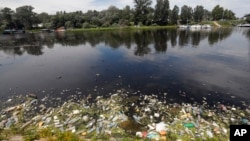Pollution, habitat degradation, climate change and overuse of freshwater resources are putting a strain on Europe, with only a third of its surface water in good health, the European Environment Agency warned Tuesday.
"The health of Europe's waters is not good. Our waters face an unprecedented set of challenges that threatens Europe's water security," EEA executive director Leena Yla-Mononen said in a statement.
Only 37% of Europe's surface water bodies achieved "good" or "high" ecological status, a measure of aquatic ecosystem health, the EEA report said.
Meanwhile, only 29% of surface waters achieved "good" chemical status over the 2015-21 period, according to data reported by EU member states.
Europe's groundwaters — the source of most drinking water on the continent — fared better, with 77% enjoying "good" chemical status.
Good chemical status means the water is free of excessive pollution from chemical nutrients and toxic substances like PFAS and microplastics.
Surface water is threatened by air pollution — such as coal burning and car emissions — as well as the agriculture industry, whose dumped waste contaminates the soil.
"European agriculture needs to increase its use of more sustainable organic and agro-ecological practices, accompanied by incentives and a change in our food and dietary habits," the report said.
The European agency analyzed 120,000 surface water bodies and 3.8 million square kilometers (1.5 million square miles) of groundwater body areas in 19 EU countries and Norway.
It called on EEA member states to halve their use of pesticides by 2030.
"We need to redouble our efforts to restore the health of our valued rivers, lakes, coastal waters and other water bodies, and to make sure this vital resource is resilient and secure for generations to come," Yla-Mononen said.
Climate change effects, including extreme droughts and flooding, and the overuse of freshwater resources are putting a strain on Europe's lakes, rivers, coastal waters and groundwaters "like never before," the EEA said.
Governments must prioritize reducing water consumption and restoring ecosystems, it said.




